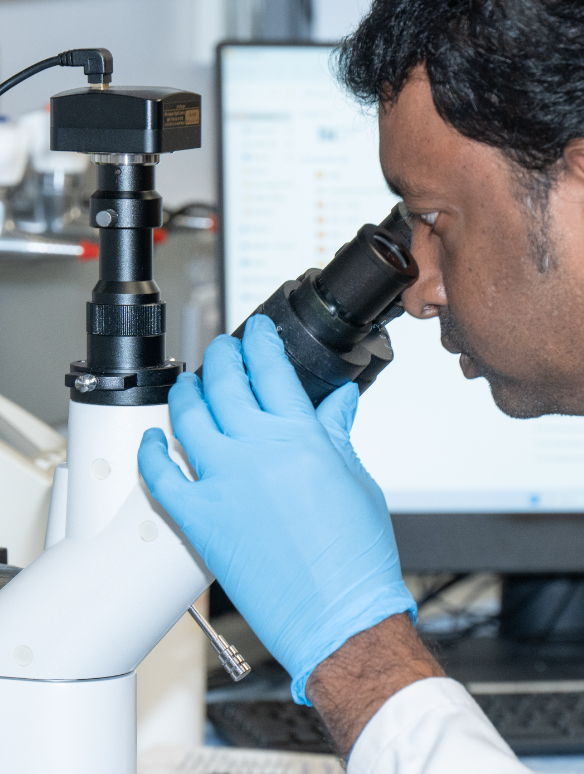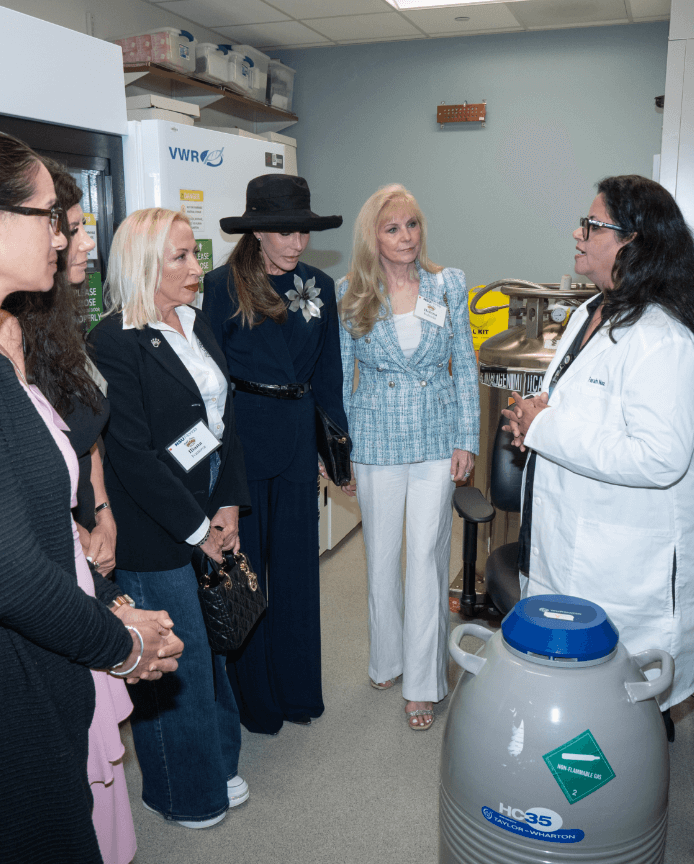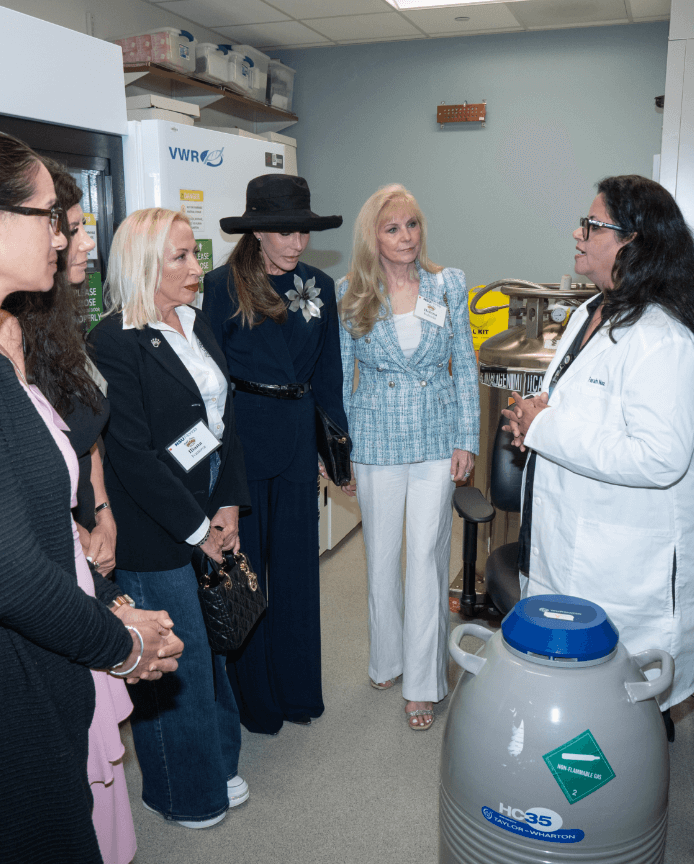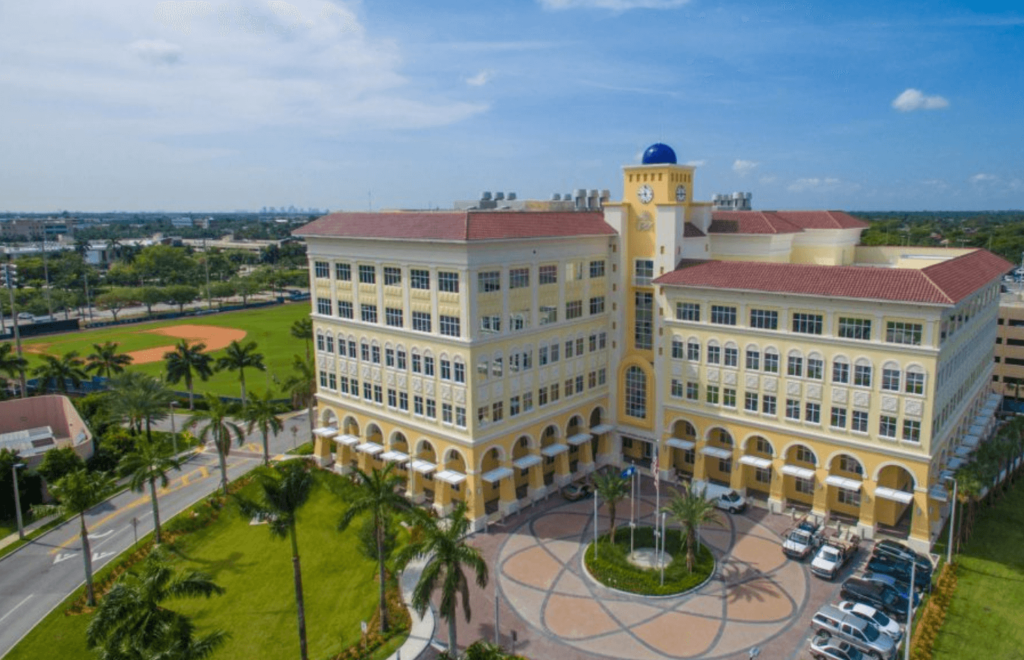- (954) 554-7855
- info@royaldames.org
- MEMBER LOGIN
Cancer Research
Ingenious Ideas, Talented Scientists, And Cutting-Edge Technology
RGI Partnership
Our Beneficiary: NSU Rumbaugh-Goodwin Institute for Cancer Research.
For more than 60 years, NSU’s Rumbaugh-Goodwin Institute for Cancer Research (RGI) has been conducting groundbreaking studies to advance the understanding and treatment of the most aggressive forms of cancer—one of humanity’s most formidable foes. With the generous and dedicated support of the Royal Dames of Cancer Research, which totals nearly $6,000,000 as of April 2025, RGI has focused on research to improve cancer diagnosis, treatments, and prognosis. Its breadth of research and discovery includes drug developments for brain, breast, ovarian, pediatric, lung, and prostate cancers, among others.
RGI Mission
Through innovative research, we are developing sensitive methods for detection, devising novel strategies for prevention, discovering new drugs for curing cancer, and saving human lives.
- Appu Rathinavelu, Ph.D.
Director, NSU Rumbaugh-Goodwin Institute for Cancer Research
"Our extremely enthusiastic students and exceptionally trained research scientists come to the lab every day collectively focused on developing novel cancer therapies that will reach patients’ bedsides in the near future."
Royal Dames’ Donations
Unwavering Support Goes into Cancer Research at RGI
Eradicating cancer is our singular and steadfast mission—one we are committed to achieving within our lifetime. Through events, programs, and membership, the Royal Dames have raised millions of dollars in support of critical cancer research at the NSU Rumbaugh-Goodwin Institute for Cancer Research. We invite you to join us in our fight for a cancer-free future for every man, woman, and child.
- $6,000,000

Areas Of Impact
Driving Discovery
The NSU Rumbaugh-Goodwin Institute for Cancer Research is dedicated to developing highly sensitive and precise methods for early cancer detection. Recognizing the critical importance of prevention. RGI’s research spans a range of cancer types, demonstrating a commitment to addressing diverse oncological challenges.
Breast Cancer
RGI researchers are actively involved in studies aimed at improving diagnostic accuracy and exploring innovative approaches for breast cancer.
Ovarian Cancer
Focused on a cancer often diagnosed at advanced stages, RGI is working to develop earlier detection tools and more effective treatment options, improving outcomes for patients.
Prostate Cancer
RGI conducts research to enhance the understanding of prostate cancer development and progression, seeking to develop more targeted and less invasive treatment strategies.
Pediatric Cancer
Recognizing the unique challenges of childhood cancers, RGI dedicates resources to research aimed at improving survival rates and reducing long-term side effects for young patients.
Glioblastoma
RGI researchers are also actively working on glioblastoma, an aggressive brain cancer, working on new methods to detect and treat this very difficult disease.
Milestones
Celebrating Our Successes
The NSU Rumbaugh-Goodwin Institute has celebrated significant milestones in the fight against cancer
7
Patents Awarded
(#1 In NSU)
70+
Publications
120+
Presentations
150+
Undergrad Students
Trained
11
Ph.D. Students
Trained
$2M+
In Sponsored
Research
$15M+
In Philanthropy
Hope For The Future
Promising Studies
- Glioblastoma Project
- Pedriatric Neuroblastoma
- Ovarian Cancer Research
In 2007, Dr. Appu Rathinavelu, director of RGI, discovered small molecule drugs (RD1 and JFD) that could slow cancer growth with minimal toxicity. Over the next few years, RGI focused on testing and developing these drugs.
In 2015, Dr. Rathinavelu made a significant discovery: RD1 could cross the blood-brain barrier when injected into the abdomen. NSU quickly assembled a team of experts to conduct further research. Dr. Rathinavelu and his team spent three weeks at the Mayo Clinic studying brain cancer models. Afterward, they replicated these models at the NSU Center for Collaborative Research (CCR) and began their own experiments. The promising results led to patent filings and publications in high-impact journals.
In 2022, RGI started planning for its first human clinical trials.
By 2024, NSU began collaborating with the University of Iowa Pharmaceuticals and Charles River Laboratories to refine RD1 for treating glioblastoma and validate its clinical use.
RGI is working on discovering better treatments for pediatric neuroblastoma, a type of cancer that develops in the nerves of babies and young children. With support from the National Pediatric Cancer Foundation, RGI is testing five compounds: RD1, JFD, RG-7388, SGI-1027, and CM272. CM272 has shown the most promise, and additional tests are being done to confirm its effectiveness. Once these tests are complete, RGI will start preclinical studies to explore how these compounds can be used in treatment. In 2024, RGI filed an invention disclosure for CM272 and RG-7388, and has since applied for funding from the Florida Department of Health and the National Cancer Institute to continue this research.
RGI scientists and graduate students are studying whether combining anticancer drugs with nuclear export signal (NES) inhibitors can treat ovarian cancer that no longer responds to chemotherapy. The team is testing drug-resistant ovarian cancer cells from a lab in England to see if NES inhibitors can help make anticancer drugs more effective against resistant cancer cells. They hope this research will lead to better treatment options and dramatically improve cancer survival rates.

In 2007, Dr. Appu Rathinavelu, director of RGI, discovered small molecule drugs (RD1 and JFD) that could slow cancer growth with minimal toxicity. Over the next few years, RGI focused on testing and developing these drugs.
In 2015, Dr. Rathinavelu made a significant discovery: RD1 could cross the blood-brain barrier when injected into the abdomen. NSU quickly assembled a team of experts to conduct further research. Dr. Rathinavelu and his team spent three weeks at the Mayo Clinic studying brain cancer models. Afterward, they replicated these models at the NSU Center for Collaborative Research (CCR) and began their own experiments. The promising results led to patent filings and publications in high-impact journals.
In 2022, RGI started planning for its first human clinical trials.
By 2024, NSU began collaborating with the University of Iowa Pharmaceuticals and Charles River Laboratories to refine RD1 for treating glioblastoma and validate its clinical use.

RGI is working on discovering better treatments for pediatric neuroblastoma, a type of cancer that develops in the nerves of babies and young children. With support from the National Pediatric Cancer Foundation, RGI is testing five compounds: RD1, JFD, RG-7388, SGI-1027, and CM272. CM272 has shown the most promise, and additional tests are being done to confirm its effectiveness. Once these tests are complete, RGI will start preclinical studies to explore how these compounds can be used in treatment. In 2024, RGI filed an invention disclosure for CM272 and RG-7388, and has since applied for funding from the Florida Department of Health and the National Cancer Institute to continue this research.

RGI scientists and graduate students are studying whether combining anticancer drugs with nuclear export signal (NES) inhibitors can treat ovarian cancer that no longer responds to chemotherapy. The team is testing drug-resistant ovarian cancer cells from a lab in England to see if NES inhibitors can help make anticancer drugs more effective against resistant cancer cells. They hope this research will lead to better treatment options and dramatically improve cancer survival rates.

RGI Collaborative Partners






RGI Partnership
Where Groundbreaking Research and World-Class Academics Come Together.
Over a half-century ago, the Royal Dames began their support of what would become in 2000 the Rumbaugh-Goodwin Institute. In 2005, the Rumbaugh-Goodwin Institute made a strategic decision to merge with Nova Southeastern University, one of the largest not-for-profit independent universities in the nation. This critical merger with NSU, an R1 research university, afforded RGI opportunities for wider collaborations in both basic and translational research, as well as increased the overall portfolio of cancer research studies conducted at both the Institute and the university.
RGI’s Research Facility
RGI’s offices and labs are located on the sixth floor of NSU’s Center for Collaborative Research (CCR), one of the largest and most advanced research facilities in Florida. Located adjacent to the NSU Health complex, the 215,000-sq.-ft., six-story CCR is equipped with wet and dry labs; state-of-the-art research equipment, including access to a high-performance computing environment; and other resources, such as Florida LambdaRail, a high-speed broadband service delivery network with connectivity throughout the nation.
Fueling Breakthroughs, Together
Advancing Cancer Research, One Discovery at a Time
We’re committed to pushing the boundaries of cancer research, driving progress towards new treatments and cures. Explore our latest research findings and see the tangible impact of your potential support. Download our comprehensive research report to learn more about our contributions.
Select year
Stay Informed
Subscribe to Our Newsletter
Messages of Hope in the Fight against Cancer
- (954) 903-1769
- info@royaldames.org
- 3296 N Federal Highway #11525, Fort Lauderdale, FL, 33339
- All rights reserved.
